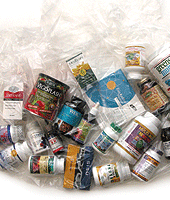Advertisement
Health Defenders
Choosing the right foods, supplements, and herbs to support your immune system is the best strategy for winning the battle against colds, flu, infections, and other immune challenges. Based on recent scientific findings, here’s your immune-support shopping list. Use it as a guide for designing your personalized immune health program and for selecting high quality … Continued

Choosing the right foods, supplements, and herbs to support your immune system is the best strategy for winning the battle against colds, flu, infections, and other immune challenges.
Based on recent scientific findings, here’s your immune-support shopping list. Use it as a guide for designing your personalized immune health program and for selecting high quality preformulated immune health products at your local health store.
A is for Astragalus
Astragalus (Astragalus membranaceous) is a traditional Chinese medicine. There are hundreds of published clinical studies to substantiate its positive effects on the human immune system. It is beneficial for infections (especially respiratory), stress-related immune dysfunction, recovery after illness or surgery, and cancer treatment. It can also help you resist disease, colds, and flu. Dr. Andrew Weil, a proponent of astragalus, asserts that regular use is safe and effective, and he recommends between 250 to 500 mg of a standardized root extract with 15-percent polysaccharides daily.
Fish and Fax for Immunity
Omega-3 fatty acids oils from fatty, cold-water fish and ground flaxseeds are good for just about every aspect of health. Clinical studies report that omega-3 fatty acids are exceptionally supportive of healthy immune function. They are anti-inflammatory and immunomodulatory, which means they are especially beneficial to people with rheumatoid arthritis, Crohn’s disease, ulcerative colitis, psoriasis, lupus erythematosus, multiple sclerosis, and migraine headaches.
Natural food sources of omega-3 fats include salmon, sardines, herring, and mackerel. Flaxseeds (ground) and walnuts are also rich sources of omega-3s. While the daily nutritional requirements vary for each person, an average daily intake of 1,000 to 2,000 mg is optimal, although the British Journal of Nutrition reported that dosages as low as 600 mg daily had a positive effect on the immune function of elderly subjects.
Garlic Goodness
Garlic has long been the immune darling of cooks and health advisors. A study published in 2004 in International Immunology supports previous research that shows the organosulfur compounds in garlic stimulate lymphocytes (white blood cells that fight infection and disease) and have anti-tumour properties.
Many people cannot deal with the digestive or social consequences of raw garlic. Fortunately garlic extract supplements provide an odour-controlled alternative. Supplemental sources of garlic come in capsules, tablets, soft gel capsules, and liquid. Ideally, choose an organic source. The dosage varies according to individual needs. At the onset of symptoms, it is advisable to take a higher dosage of 200 to 300 mg three times daily and reduce to 200 to 300 mg once daily when the symptoms of infection subside. Dr. Andrew Weil insists raw garlic is best and suggests eating two cloves of raw garlic daily, chopped and put into sandwiches, soups, and salads.
Sterols Modulate Immune Responses
Sterols and sterolins are a more recent immune support discovery. The immune modulating effects of sterols and sterolins were popularized through the extensive work of Lorna Vanderhaeghe, author of Healthy Immunity (Prentice Hall, 2002). Sterols and sterolins are the cholesterol component of plants and are a natural component of raw nuts and seeds. Choose a name brand product with research behind it and consumer support such as a toll-free consumer information number or website. The recommended dosage varies according to the reason for use, so it is best to follow the directions on the label and in the product literature.
More Immune Supporters
Here’s a checklist of additional immune support herbs and nutrients to keep your health defence arsenal well-stocked. Refer to the label directions to determine appropriate use.
Echinacea Available in many forms, standardized Echinacea extract is still the most popular immune booster. It is most effective when taken in high and frequent doses at the first sign of infection, but is not recommended for long-term, continuous use, or in cases of autoimmune dysfunction.
Ginseng A traditional herbal tonic used to adapt to stress, ginseng, in its many varieties, is beneficial to immune function.
Glutathione (reduced) An important health aid that improves immune function by reducing toxic load.
Green tea (Camellia sinensis) As a daily beverage, green tea provides constant and safe immune protection.
Mushrooms The shiitake, enokidake, maitake, and oyster mushrooms are rich in polysaccharide and amino acid components that help stimulate immune cell activity.
Oregano oil This distilled essential oil of Origanum vulgare is most useful to fight yeast and fungal infections.
Oregon grape (Berberis aquifolium) An alternative to the endangered golden seal root, Oregon grape contains similar active ingredients for fighting infections.
Probiotics This extensive family of friendly, immune-supporting lactic bacteria is essential to good health.
Selenium A trace mineral with the immune power to fight cancer, cold sores, and inflammation.
Tea tree oil (Melaleuca alternifolia) For topical use only, tea tree oil speeds healing of skin and scalp wounds and infections.
Vitamin A This vitamin helps keep bacteria and viruses from penetrating protective mucous membranes. Choose water soluble sources such as palmitate and mixed carotenoids.
Vitamin B complex The great stress fighters, B vitamins help support immune function by controlling the negative impact of stress.
Vitamin C The original immune booster made famous by Dr. Linus Pauling.
Zinc An essential trace mineral, critical to the healthy function of the immune system.
With this handy shopping list and the help of qualified advisors at your local health food store, you will be well on your way to boosting your immune system.




